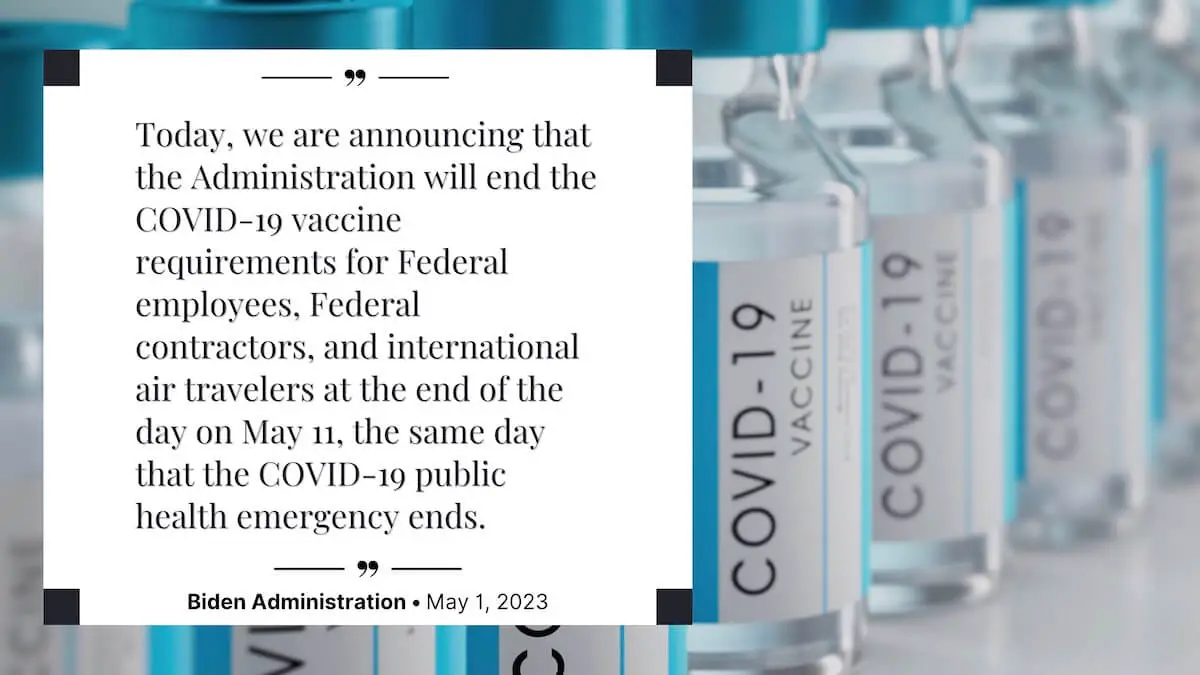President Biden signed an Executive Order on May 9, 2023, formally rescinding the COVID vaccine mandate and COVID-19 safety protocols for federal employees and contractors, which took effect on May 12, 2023. This follows the Biden Administration’s release on May 1, 2023, announcing their intent and plan to end several of the COVID-era vaccine policies and requirements.

Specifically, the order revokes both Executive Orders 14042 and 14043, which originally implemented requirements for all federal employees and contractors to receive a COVID-19 vaccination or apply for a medical/religious exemption.
Along with lifting the requirements for federal employees, the Biden Administration also announced they are lifting the requirement for international air travelers—effective at the end of May 11, 2023—and will work closely with the Department of Health and Human Services and the Department of Homeland Security to start the process of ending the vaccination requirements for certain educators, in certified healthcare facilities, and for certain noncitizens at the land border.
While more details are expected to be provided in the coming days, the Safer Federal Workforce Task Force (“Task Force”) has updated their vaccination information, largely indicating a return to what things were prior to the pandemic.
Regardless, below is a short summary of what federal employees and contractors need to know about the upcoming rescission of the vaccine mandate.
What Federal Employees and Contractors Need to Know
Following the announcement and order from the Biden Administration, agencies should no longer take any action to implement or enforce the COVID-19 vaccination requirement pursuant to Executive Order 14043. Additionally, agencies should stop requesting or requiring potential employees to provide information about their vaccinations as a prerequisite for employment.
However, agencies that have COVID-19 vaccination requirements for employees under agency-specific authorities, i.e., requirements not based on Executive Order 14043, may continue to demand that workers disclose their vaccination status, including proof of vaccination from current and prospective workers subject to those requirements, as well as from agencies with other setting-specific dependencies on gathering vaccination data from workers. When obtaining such information, agencies must adhere to all applicable federal regulations, including the Privacy Act and the Rehabilitation Act of 1973.
Additionally, agencies must continue to preserve existing vaccination information collection systems and employee information gathered to date in accordance with the Federal Records Act and other recordkeeping requirements.
Similarly, with respect to federal contractors, Task Force guidance has stated that “agencies should not take any steps to require covered contractors and subcontractors to come into compliance with previously issued Safer Federal Task Force guidance or enforce any contract clauses implementing Executive Order 14042.”
Lastly, in the general provisions of the new Executive Order, it is specified that the order was—and will—not create “any right or benefit, substantive or procedural, enforceable at law or in equity by any party against the United States, its departments, agencies, or entities, its officers, employees, or agents, or any other person.” This was anticipated, as generally, whatever guidelines were in place at the time dictated each case, so without the complete reversal of the vaccine mandate as a whole, there is little room for legal recourse for a federal employee who was punished for refusing to test or vaccinate.
A Temperature Check on the COVID Climate in the Federal Workforce
As we emerge from the pandemic, it will be interesting to see how discussions revolving around other COVID-era policies will exist in a pandemic-free America. Issues surrounding remote work have already resurfaced in the national spotlight, with the Stopping Home Office Work’s Unproductive Problems Act, continuing to threaten to pull a large portion of government employees back to the traditional in-person office setting.
While this isn’t necessarily a surprise, federal employees with telework agreements or some form of reasonable accommodations set up in part due to the pandemic should continue to monitor for any future guidance and be in touch with their managers to best protect their careers and physical health.
If you have additional questions surrounding the Executive Order or what your rights are when it comes to teleworking or access to reasonable accommodations, our team of attorneys is available to assist you today.



